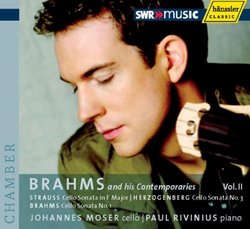A Very Successful Concept Album
M. C. Passarella | Lawrenceville, GA | 10/24/2008
(5 out of 5 stars)
"This is one in a series of recordings by cellist Johannes Moser that unite the music of Brahms with that of contemporaries and near-contemporaries. It's a very nice idea and one that's a sure bet because of the high production values involved. First of all, the performers are first rate and have obvious sympathy with their subject matter. These are fully competitive performances of the often-recorded sonatas by Strauss and Brahms, the Strauss brimming with youthful exuberance, the Brahms smoldering with a dark passion. Moser's tone production and technique are excellent, and his accompanist is equal to the very different demands of the three sonatas. Plus SWR provides a rich and intimate sound recording.
The inclusion of the rarely heard Herzogenberg Third Sonata casts interesting light on the other two sonatas and so makes this a valuable program beyond the basic of excellence of playing and recording. Heinrich von Herzogenberg, as the "von" in his name implies, came from a well-connected and well-to-do family, and his music is sometimes wrongly seen as that of a mere dilettante. Another strike against him is that he admired Brahms so much his music often sounds like a pale imitation. But the Third Sonata shows how he differed from Brahms. It is much more relaxed and unselfconscious than Brahms ever allowed himself to be in his sonata-form compositions. If it sounds like Brahms, it's the Brahms of the waltzes, Liebeslieder or otherwise. The Herzogenberg sonata has a folk-like simplicity and charm, even in its variations finale. An immediately attractive and likeable work, it's as unlike Brahms's two sonatas in character as one could imagine, even if the sound world it inhabits clearly shows Herzogenberg's Brahmsian sympathies.
Just so, the Strauss sonata finds the young composer paying tribute to Brahms as well as Schumann, Mendelssohn, and Schubert while at the same time establishing a personal voice that's youthful and fresh, coolly assured. Brahms emerges, as the notes to the recording suggest, as the fixed star by which the two younger composers navigate. But like the star, Brahms's art is lofty and aloof. The rigorously complex sonata-form first movement, the air-tight logic of the last movement's counterpoint: these are virtues far from the thoughts of Strauss and Herzogenberg in their sonatas.
As the saying goes, imitated but never equaled. The two younger composers knew they couldn't equal the master and so created works that are, luckily for us, more than mere imitations."


 Track Listings (9) - Disc #1
Track Listings (9) - Disc #1